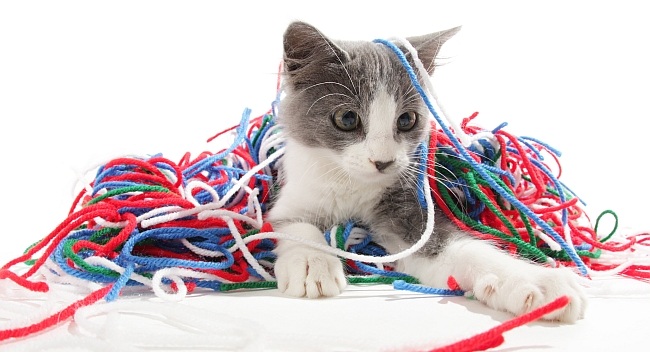
Kittens are undeniably fragile creatures. They have tiny paws, delicate bones, and make sounds that resemble more of a squeak than a “meow.” How do you bring something so frail into a large environment? What should you be wary of in the home, and how can you keep the kitten protected? How should adults and children play with a kitten? Below are some of the key considerations when bringing in a little kitty into his new home.
Playtime and Handling
The first rule thumb is to always be gentle. Handle young kittens carefully, without holding them too tightly or pulling their limbs. Young kittens are quite flexible, but stretching their legs could easy strain them and cause pain or damage. And while it might be fun to roll the kitty around, flip him or hold him by his neck, remember that they are fragile and should be handled with caution. Be wary of letting young children play with the kitten unattended, as they can tend to be rough without realizing they are hurting the little pet. Have an adult supervise children playing with the kitten at all times, instructing them on how to properly support the kitten’s legs and back. Be sure to hold, stroke, and carry your kitten often so that he will be familiar with frequent human touch.
As the kitten grows, help him become familiar with his paws being handled, as well as his teeth being examined from time to time. This will train him to be easy to handle for any nail clipping, tooth brushing, grooming appointments or trips to the vet. The kitten should be well socialized, comfortable being held, carried, and examined so that they will be easy to handle by yourself and others.
Help the kitten learn healthy playtime rules from a young age. Be gentle with them, but also practice teaching good habits by making playtime constructive. Open up a wide space on a carpeted area, and let your kitten chase around a laser, feather or toy mouse. Let the kitten roam freely around the space to gain confidence. While cuddling and playing, never your body as the object they chase/bite/attack, as it will train them that this sort of play is acceptable in the future. Have firm boundaries, without administering any kind of punishment toward your kitten. After all, he is still learning!
Safety in the House
Beyond the basic concerns such as kids or other animals in the home, a responsible pet owner ought to take into consideration the other areas of danger which could present a problem. Kittens have been known to get tangled up in window blind cords, or stuck in air vents, poisoned by cleaning products, or attacked by other animals in the house. Protect your kitten from danger by identifying the hazards.
When walking around your home, ask the following kinds of questions: Are there areas in the floor where a kitten could have his foot caught? Is that item something he might accidentally eat? Are there cleaning products nearby which are poisonous to kitties? Is there any plant or hanging string that he could get tangled in, or a hole where he might be trapped? Are there electrical dangers, or cords the kitten might chew on? Is the toilet seat, dishwasher or drier left open? Cats are known to climb anything that is stable, and play with anything that moves; be sure to check your home for any possible areas where your kitten could get into trouble. Here are some items that cat-owners should be wary of:
Choking Hazards
- rubber bands
- game pieces
- small toys
- balloons
- coins
- decorations
- jewelry (earrings, necklaces, etc)
- buttons
- beads
- cotton balls
- Q-tips
- dental floss
- shoe laces
- yarn/string/ribbon
- plastic shopping bags
- craft supplies such as play-dough, confetti, glitter, glue sticks, etc.
Sharp Items
- staples
- paperclips
- scissors
- tooth picks
- thumb tacks
- Needles
- Tools
- screws/nails
- chicken/fish bones
Poisonous Items
- prescription pills
- facial cleansers/soap
- house cleaning supplies
- fabric softener
- cosmetics
- antifreeze
- bleach
- coffee grounds
- certain house plants (lilies, mistletoe, poinsettia, tomato leaves, daffodils, etc)
Further Precautions
- Tie up any window blind cords out of your kitten’s reach
- Make sure your dishwasher is never left open
- Always put the toilet seat down
- Cover electrical outlets with plastic plugs
- Keep electrical cords wounds up and out of reach (or covered with a thick cable protector)
- Check chair recliners before closing them to make sure your kitty isn’t trapped inside
- Put covers on all trash cans
- Keep watch over lit candles to make sure your cat doesn’t play with the wax/fire
- Don’t leave out food scraps that might have bones/toxic elements in them
Don’t let this long list of hazards put you off from getting a cat! Having a loyal companion is well worth the trouble it takes to kitty-proof a home, though the process may seem tedious initially. These few adjustments are a small price to pay for the lifelong love of a cat.

